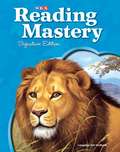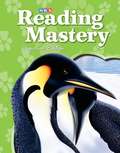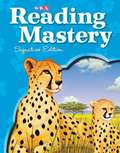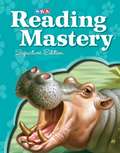- Table View
- List View
SRA: Reading Mastery, Signature Edition, Language Arts Textbook [Grade 3]
by Jerry Silbert Siegfried Engelmann Susan HannerNIMAC-sourced textbook
SRA: Reading Mastery, Signature Edition, Language Arts Textbook [Grade 4]
by Jerry Silbert Siegfried Engelmann Steve OsbornNIMAC-sourced textbook
SRA: Reading Mastery, Signature Edition, Language Arts Workbook [Grade 1]
by Siegfried Engelmann Jean Osborn Karen Lou Seitz DavisWorkbooks provide skill and comprehension activities andshape students¿ ability to work independently.
SRA: Reading Mastery, Signature Edition, Language Arts Workbook [Grade 2]
by Jerry Silbert Siegfried Engelmann Karen Lou Seitz DavisWorkbooks provide skill and comprehension activities andshape students' ability to work independently.
SRA: Reading Mastery, Signature Edition, Language Presentation Book A, Grade K
by Siegfried Engelmann Jean OsbornNIMAC-sourced textbook
SRA: Reading Mastery, Signature Edition, Language Presentation Book B, Grade K
by Siegfried Engelmann Jean OsbornNIMAC-sourced textbook
SRA: Reading Mastery, Signature Edition, Language Presentation Book C, Grade K
by Siegfried Engelmann Jean OsbornNIMAC-sourced textbook
SRA: Reading Mastery, Signature Edition, Language Presentation Book D, Grade K
by Siegfried Engelmann Jean OsbornNIMAC-sourced textbook
SRA: Reading Mastery, Signature Edition, Language Workbook A & B [Kindergarten]
by Siegfried Engelmann Jean OsbornNIMAC-sourced textbook
SRA: Reading Mastery, Signature Edition, Language Workbook C & D [Kindergarten]
by Siegfried Engelmann Jean OsbornNIMAC-sourced textbook
SRA: Reading Mastery, Signature Edition, Literature Anthology [Grade 2]
by Siegfried Engelmann Susan HannerNIMAC-sourced textbook
SRA: Reading Mastery, Signature Edition, Presentation Book A, Grade K
by Siegfried Engelmann Elaine C. BrunerNIMAC-sourced textbook
SRA: Reading Mastery, Signature Edition, Presentation Book B, Grade K
by Siegfried Engelmann Elaine C. BrunerNIMAC-sourced textbook
SRA: Reading Mastery, Signature Edition, Presentation Book C, Grade K
by Siegfried Engelmann Elaine C. BrunerNIMAC-sourced textbook
SRA: Reading Mastery, Signature Edition, Storybook 1 [Grade 1]
by Siegfried Engelmann Elaine C. BrunerNIMAC-sourced textbook
SRA: Reading Mastery, Signature Edition, Storybook 2 [Grade 1]
by Siegfried Engelmann Elaine C. BrunerNIMAC-sourced textbook
SRA: Reading Mastery, Signature Edition, Storybook [Kindergarten]
by Siegfried Engelmann Elaine C. Bruner<i>Advisory: Bookshare has learned that this book offers only partial accessibility. We have kept it in the collection because it is useful for some of our members. To explore further access options with us, please contact us through the Book Quality link on the right sidebar. Benetech is actively working on projects to improve accessibility issues such as these. </i>
SRA: Reading Mastery, Signature Edition, Textbook A [Grade 2]
by Siegfried Engelmann Susan HannerNIMAC-sourced textbook
SRA: Reading Mastery, Signature Edition, Textbook A [Grade 3]
by Siegfried Engelmann Susan HannerNIMAC-sourced textbook
SRA: Reading Mastery, Signature Edition, Textbook A [Grade 4]
by Siegfried Engelmann Jean Osborn Steve OsbornNIMAC-sourced textbook
SRA: Reading Mastery, Signature Edition, Textbook A [Grade 5]
by Siegfried Engelmann Jean Osborn Steve OsbornReading Mastery textbooks are included in student materials focusing on helping students become fluent, accurate readers.
SRA: Reading Mastery, Signature Edition, Textbook B [Grade 2]
by Siegfried Engelmann Susan HannerNIMAC-sourced textbook
SRA: Reading Mastery, Signature Edition, Textbook B [Grade 3]
by Siegfried Engelmann Susan HannerNIMAC-sourced textbook
SRA: Reading Mastery, Signature Edition, Textbook B [Grade 4]
by Siegfried Engelmann Jean Osborn Steve OsbornNIMAC-sourced textbook
SRA: Reading Mastery, Signature Edition, Textbook B [Grade 5]
by Siegfried Engelmann Jean Osborn Steve OsbornReading Mastery textbooks are included in student materials focusing on helping students become fluent, accurate readers.













